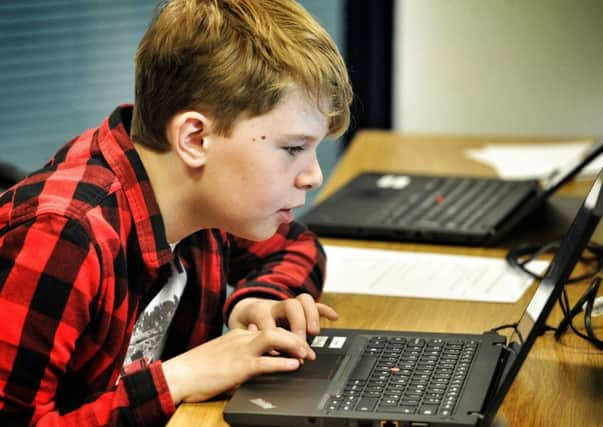David Richards: Inspiring a new generation of computer coders


It is exactly the same with computer programming.
The emphasis should be on the potentially great practical applications you can create from the code.
Instead, schools, companies and Government organisations are rolling out all sorts of coding initiatives across the land.
Advertisement
Hide AdAdvertisement
Hide AdHowever well intentioned, teaching young people how to write Scratch, HTML or CSS is not the answer to the skills shortage in our fast-growing technology sector, nor to the many problems facing humankind at this stage of history.
Many of the skills they acquire will be rendered obsolete by automation by adulthood.
Machines are gobbling up human tasks like Pacman and code creation will soon be the preserve of artificial intelligence.
Creativity offers the only solution.
It gives us the ability to control and make sense of the billions of pieces of new information being created every moment in this new stage of the digital age.
Advertisement
Hide AdAdvertisement
Hide AdTeaching computing cannot be about memorisation and recall. We should be focusing on data science and encouraging young people to think about how to solve real-world problems.
These might include predicting the chance of snowfall locally, the outcome of the football derby or how to avoid a particular long-term health condition.
The opportunities are limited only by imagination.
Applied data science is much more accessible and inspiring than coding.
However you try to frame coding, it is a pretty dull practice and not everyone has an aptitude for it.
Advertisement
Hide AdAdvertisement
Hide AdWhen I visited my old school in Sheffield, I was appalled at how they were having to teach computing under the National Curriculum.
It was unsurprising at how few people chose to go on and study it at sixth form.
The experience brought back my own memories of school more than three decades ago.
My classmates and I loved playing home computer games like Daley Thompson’s Decathlon, Manic Miner and Jetpac.
Advertisement
Hide AdAdvertisement
Hide AdWe were interested in programming games, but our lessons were about components and the difference between RAM and ROM.
Which was dreadfully boring.
Fortunately, a sixth-form teacher saw my eagerness for practical learning and guided me towards a new type of higher-education institution.
Off I went to the University of Huddersfield to learn skills relevant to industry.
Red-brick universities were teaching logic, while I was learning script.
Advertisement
Hide AdAdvertisement
Hide AdDuring my sandwich year at ICI, I had a management role, a budget and a computer network to implement.
Nearly everyone on my course went on to have a great career because they learnt skills of value in the real world.
It was more like a useful training class, unburdened with lofty concepts.
Funnily enough, this is how the education system works in the United States.
Advertisement
Hide AdAdvertisement
Hide AdIs it a coincidence that the world’s most powerful technology companies are all born in the USA?
I believe we have a fighting chance in the UK.
If we are inspiring the right minds and teaching the right data analytics skills in schools, our future innovators will emerge.
We need to engage schoolchildren with computing in the same way that the British astronaut Tim Peake has been doing with science through the European Space Education programme.
As my own experience shows, universities have a vital role to play. They are doing some great work applying data science to real-world problems.
Advertisement
Hide AdAdvertisement
Hide AdThey could do more to share these projects with schools and help fire up those hungry young minds.
Witness the University of Salford’s Sports Analytics Machine, which looks at player performance to predict team outcomes, or how the University of Sheffield is achieving breakthroughs in dementia research through advanced data analytics.
Pupils should have the chance to see how the combination of curiosity, data and the latest technology is having an impact today.
We are doing our bit.
With my wife, we have launched the David and Jane Richards Family Foundation with £1.4m of our own money to provide hands-on computing and environmental programmes.
Advertisement
Hide AdAdvertisement
Hide AdFor a number of years, I have complained about the state of computer studies in our schools.
This is our attempt to try to fix it.
David Richards is founder and CEO of WANdisco, a Big Data software company dual-headquartered in Silicon Valley and Sheffield.